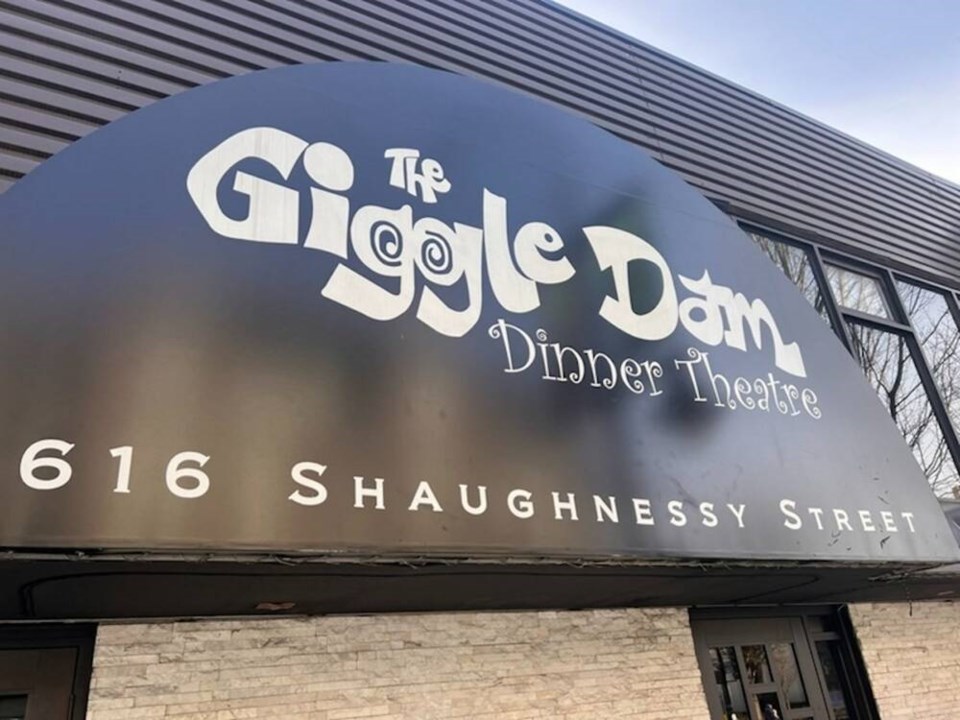If Port Coquitlam was a Monopoly board game, the city would be a key player — and landlord — after purchasing several properties in the downtown core and plans to buy more.
Last month, the city purchased four, mostly older, low-rise buildings, for an undisclosed sum.
Among the notable purchases is the 1940s’ era Giggle Dam building, at 2616 Shaughnessy St., valued at $1.95 million, according to BC Assessment.
The Giggle Dam building has been empty since the dinner theatre business vacated for unpaid rent.
There is no word yet on whether the city plans to rent out the space, which is currently vacant.
Also recently purchased is the pop-up park next door and commercial properties on Elgin Avenue, including 2275-2277 and 2288 Elgin Ave.
According to BC Assessment, Giggle Dam was sold June 9, along with the pop-up parks.
These strategic purchases are on top of downtown properties the city already owns:
- 2263 McAllister Ave. (current home of PoCo Bowl), purchased in 2019
- 2604-2608 Shaughnessy St., 2283-2285 McAllister Ave. commercial building purchased last year
- 15,000 sq. ft. of commercial space in The Met building, which is being rezoned for more density
Other than a few properties, such as 2627 Shaughnessy, home of City Avenue Market, there hasn’t been a lot of redevelopment in the area, especially with housing.
With recent property acquisitions, a potential transformation could soon be under way.
However, there are no timelines for re-development, according to the city, which doesn’t see any future development occurring until at least 2026.
Still, PoCo is enthusiastic about purchasing even more properties while selling others to pay for the plan.
On Tuesday (July 25), council approved taking out a $25.2 million with the Municipal Finance Authority (MFA) to acquire the properties.
It plans to pay back the loan in five years, including interest payments estimated at $112,140 per month (5.34% interest), through a combination of the sale of surplus city lands and its land sale reserve.
To come up with a plan, PoCo is working with realtors and property managers.
Bruce Irvine, the city’s director of planning and development, told Tuesday’s council meeting that a land inventory is currently underway.
“The city is now working on first steps toward a land strategy, which will come by early fall, in October with specific sites ready to sell,” Irvine said.
Councillors expressed support for the downtown property acquisition and loan to help the city secure the shape of its downtown vision.
“The city is taking action to assemble smaller parcels, coordinate new infrastructure and encourage high quality commercial tenants. These steps help position city lands to be more attractive to private sector developers as part of our efforts to revitalize the downtown,” stated Coun. Dean Washington, council’s designate for finance and downtown in an email to the Tri-City News.
The city’s mayor Brad West also backed the plan, saying buying strategic properties is a “smart investment” and will assist the city in laying the groundwork for “future generations.”
“Overall, it fits into the picture of what see seen coming together in our city, responsible financial management, smart investments,” West said.
The land purchase plan has support from the Downtown Port Coquitlam BIA.
In an email, executive director Jennifer McKinnon said purchasing strategic properties will enable the city to have some control over future development.
"Downtown areas often suffer from neglect, resulting in vacant buildings and underutilized spaces. The city purchasing downtown land can be a catalyst for urban revitalization.
"The city can implement redevelopment plans, renovate existing structures, and create vibrant public spaces that attract residents, tourists, and businesses."





